A single bench of Justice Bharati Dandre and Justice Manjusha Deshpande of the Bombay High Court issued a ruling to release the juvenile accused in the Pune Porsche car accident case from an observation home.
The bench delivered the order today after deliberating on it since June 21. The Court deemed the initial custody order as unauthorized and lacking jurisdiction. Consequently, it stipulated that the adolescent should be under the care of his paternal aunt.
Furthermore, the Court emphasized that the young individual is presently undergoing rehabilitation, a key focus, and has been recommended to consult with a psychologist.
The court order was issued subsequent to the aunt of the minor petitioning the High Court, alleging that the Juvenile Justice Board (JJB) had unlawfully and arbitrarily detained the minor in an observation home.
The juvenile, who is the son of a prominent builder in Pune, collided with a motorcycle while driving his Porsche in the Kalyani Nagar area, resulting in the loss of two lives. Investigations revealed that the minor had consumed alcohol at a pub with friends before the tragic incident. The vehicle reportedly dragged one of the individuals on the motorcycle before coming to a halt after striking another motorcycle and a car.
The minor was charged with reckless and negligent driving, causing harm by endangering lives, and death due to negligence under sections 304A, 279, 337, and 338 of the Indian Penal Code (IPC), in addition to provisions of the Maharashtra Motor Vehicles Act. Although granted bail on May 19, the minor was subsequently remanded to an observation home.
Advocate Swapnil Ambure filed a plea with the High Court, asserting the immediate release of the juvenile. During the initial hearing on June 14, Senior advocate Abad Ponda, representing the petitioner, requested the juvenile’s prompt release. He also sought time to amend the petition to include the June 13 order extending the minor’s detention in the observation home. While permitting Ponda time to make amendments, the division bench declined to provide immediate relief without a full hearing of the plea.
In the recent hearing, Chief Public Prosecutor Hiten Venegaonkar, representing the Pune police, raised objections regarding the admissibility of a habeas corpus plea. He argued that a writ of habeas corpus could only be filed if the order was deemed illegal, pointing out the availability of alternative remedies to challenge the JJB order.
Ponda countered by citing Supreme Court precedents emphasizing expedited proceedings in matters concerning personal liberty.
Venegaonkar emphasized the necessity to assess the order’s procedural soundness before considering a challenge. Ponda maintained that the order could be contested based on its alleged illegality and questioned the rationale behind sending the juvenile to an observation home post-bail. He argued that such a measure is only warranted when placing the minor with family is unfeasible.


